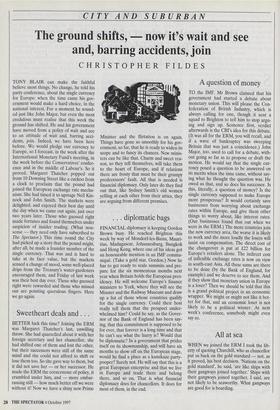A question of money
TO the IMF, Mr Brown claimed that his government had started a debate about monetary union. This will please the Con- federation of British Industry, which is always calling for one, though it sent a squad to Brighton to tell him to stop argu- ing and sign up. Sentence first, verdict afterwards is the CBI's idea for this debate. (It was all for the ERM, you will recall, and if a wave of bankruptcy was sweeping Britain that was just a coincidence.) John Major, too, used to call for a debate, with- out going so far as to propose or draft the motion. He would say that the single cur- rency posed a question to be answered on its merits when the time came, without say- ing what he thought the question was. He owed us that, and so does his successor. Is this, literally, a question of money? Is the single currency supposed to make Europe more prosperous? It would certainly save businesses from worrying about exchange rates within Europe, and give them other things to worry about, like interest rates. (Our businesses found that out when we were in the ERM.) The more countries join the new currency area, the worse it is likely to work and the more loudly the losers will insist on compensation. The direct cost of the changeover is put at f22 billion for Europe's retailers alone. The indirect cost of inflexible exchange rates is now on view in south-east Asia. All these sums are there to be done (by the Bank of England, for example) and we deserve to see them. And if they show that monetary union in Europe is a loser? Then we should be told that this is a grand political project in an economic wrapper. We might or might not like it bet- ter for that, and an economic loser is not likely to be a political winner. At next week's conference, somebody might even say so.










































































 Previous page
Previous page